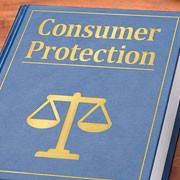Blog
How Consumer Protection Laws Affect Your Business
How Consumer Protection Laws Affect Your Business

In the good old days, owners of honestly-run businesses had little reason to fear.
“Caveat emptor,” or let the buyer beware, was the norm. Contract laws, particularly those involving warranties, provided consumers with the ability to sue under some circumstances, but it was relatively easy for companies to avoid the long arm of the law.
Those days are gone. Today, the arms of the law continue to get longer.
An intricate web of consumer protection laws can snare even the most ethical of business owners. At both the state and federal levels, laws outlining prohibited advertising and pricing practices lurk. Companies that fail to do their homework and take these laws into account when training employees, do so at their own peril.
Here is a rundown of some of the laws protecting consumers that can affect your business:
Deceptive Advertising
Consumer protection statutes vary from state to state and industry to industry. But one issue that is almost always addressed is protection from deceptive advertising.
 In general, ads are unlawful if they mislead or deceive the consumer. This is true even if there is no intent on the part of the business to mislead. To determine whether an ad is deceptive, the Federal Trade Commission (FTC), the courts, and consumer protection agencies in the states look at the overall impression it leaves, rather than the truth of the individual components. An ad that is technically true, can still be misleading and can be found in violation of the law.
In general, ads are unlawful if they mislead or deceive the consumer. This is true even if there is no intent on the part of the business to mislead. To determine whether an ad is deceptive, the Federal Trade Commission (FTC), the courts, and consumer protection agencies in the states look at the overall impression it leaves, rather than the truth of the individual components. An ad that is technically true, can still be misleading and can be found in violation of the law.
Deceptive Pricing
Deceptive pricing, a subcategory of deceptive advertising, is another way for your business to get unwanted attention. Charges of deceptive pricing arise when companies use price comparisons in advertising or in-store displays. The laws focus on two types of comparisons — comparison to a former price and comparison to a competitor’s price.
Former Price Comparisons
When advertisements compare a current price to a former price, it is essential that the earlier price be bona fide. The product must have been actively sold and available at that price for a period of time. It isn’t necessary that the item actually be purchased by anyone but it is required that there is a good faith attempt to sell the product at the former, higher price.
Avoid the temptation to take a product, put it on sale at a price higher than it could reasonably be expected to sell, and then drop the price a couple days later so the new price seems like a bargain.
Comparing Competitor Prices
When comparing the price of a product to one charged by a competitor, make sure the competitor is selling an identical product and that the competitor has sold enough of the item to make the advertised sale price a legitimate bargain. Failure to do so could be seen as deceptive.
The movement toward greater consumer protection doesn’t stop with deceptive advertising and pricing. More and more states are regulating other aspects of business in the name of consumer protection. Automobile “lemon laws” are a prime example.
Furthermore, most state consumer protection laws grant consumers a private right to sue for damages in court. Assuming the alleged damages do not exceed the statutory maximum, these lawsuits are usually brought in small claims court and are not terribly expensive to defend. Still, having to defend and pay damages on numerous small claims court actions can add up.
The Greater Concern
The greater danger for most companies lies in class action lawsuits filed by many consumers who are affected by a consumer protection law violation. The stakes can become enormous.
Savvy business owners must be aware that state consumer protection laws often provide for damages beyond the actual damages suffered by the consumer. Triple damage provisions are commonplace in consumer protection legislation. So a suit for $500 dollars in actual damages will end up costing $1,500 in damages paid to the consumer. The damages in a class action suit under these circumstances can quickly run into tens-of-thousands of dollars or more.
However, the situation is not entirely bleak for business owners. The good news is that most trouble can be avoided. After learning the applicable laws for your industry and state, as well as the federal law, your company can educate relevant employees to ensure that no unintentional violations occur. If proper measures are taken, it is possible to keep consumers and the government satisfied — just like in the good old days.
How Federal Regulators Enforce
Consumer Laws
The financial danger for businesses from state consumer protection laws is generally far greater than the danger under federal laws, but companies should not underestimate the power of the Federal Trade Commission.
Under federal law, the FTC is charged with the task of policing false or deceptive advertising. Here is a rundown of its powers and practices:
- The FTC usually attempts to bring offending companies into line by pointing out the error of their ways and seeking voluntary compliance. Most complaints about a company come from customers and competitors.
- If, however, a company refuses to voluntarily comply with the FTC’s request, the agency has the power to enter a “cease and desist” order against the firm.
- If the cease and desist order fails to get the company’s attention, the FTC can file a civil suit asking for an injunction, and may win the right to force the firm to run ads stating that prior ads were indeed deceptive. Being forced to run such ads can do damage to a company’s credibility and goodwill.
Complying with reasonable FTC requests from the start eliminates this very real danger.
©2018
- Topics: Consumer Protection Laws
Schedule a Consultation
Newsletter Sign-Up
Sign up for industry accounting and tax tips below
